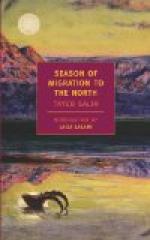We saw a band of Nunatalmutes come into Fort Macpherson to do their summer shopping. They wanted English breakfast tea, superior rifles and ammunition, and a special brand of tobacco. Failing any or all of these, it was in vain that the Factor displayed before them the wares of John Bull, Uncle Sam, or Johnny Canuck, or any seductive lure made in Germany. Ig-ly-o-bok and Nan-a-sook-tok bought what they found to their liking, took small change out of two silver-fox skins, and put the remaining six pelts back into the wooden box which formed at once their savings bank and letter of credit for the season to come. The hungry-eyed H.B. man confided to us that two of these coveted pelts had been thus exhibited to him and thus tucked back into the Eskimo sinking-fund for three successive seasons.
As regards weapons, we found Eskimo hunters in the transition stage. The old-time spears, four feet long and tipped with ivory, are still in active service. The bows, with arrows finished in copper, flint, and bone, have been relegated largely to the boys, while Krag-Jorgensen, Lee-Enfield, and other high-power guns are bought from American whalers. The fish-hooks which I got in friendly barter are interesting to any one born with angling blood in his veins. Beautifully fashioned of ivory, copper, bone, and beads, the contrivance is a sinker, bait, and hook, all in one. The daily baskets procured with this lure incontestably proves the Husky a judicious hooker.
The Eskimo is a merger. Father Petitot shows us the close analogy between the Kogmollyc language and the tongues of eastern Asiatic tribes, ancient and modern. This Eskimo’s speech, then, gives him a connection with the effete East (which is his west), while enamelled washbasins, with here and there a corrugated wash-board, prove that slowly but surely Canadian culture is reaching him from the south.
With two modifications, this Eskimo is invariably truthful. Like the Indians to the south of him, seeking to please you by answering a question in the way that you desire, he will at times tell you an untruth, for it seems to him discourteous to answer your question other than in the way which you anticipate. For instance, if you say to Roxi, “Wasn’t that a grey goose we heard overhead?” Roxi will readily assent, though he well knows it to have been a mallard duck, but he would spare your ignorance. Again, it is Eskimo etiquette to belittle your own success in hunting and, in so doing, be not literally truthful. When we place this delightful trait alongside the fish-stories we are familiar with, who would seek to change the heathen?




